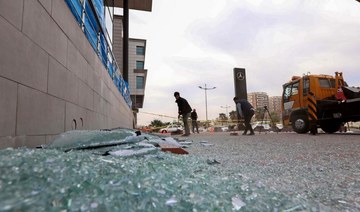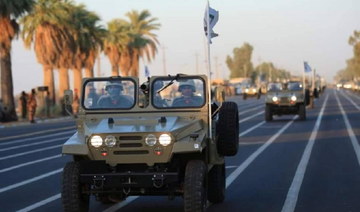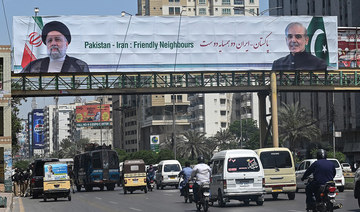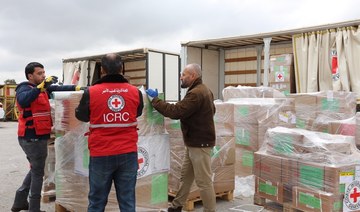BAGHDAD/CAIRO: Egypt, Jordan and Iraq agreed to bolster security and economic cooperation at a tripartite summit Sunday that saw an Egyptian head of state visit Iraq for the first time in three decades.
The visits by Egypt’s President Abdel Fattah El-Sisi and Jordan’s King Abdullah II came as Iraq seeks to move closer to Arab allies of the United States in the Middle East.
In recent years, Iraq had signed cooperation deals in the energy, health and education sectors with both countries.
El-Sisi and Abdullah met Iraqi President Barham Saleh and Prime Minister Mustafa Al-Kadhimi, with Saleh saying the encounter was “an eloquent message amid enormous regional challenges.”
“Iraq’s recovery paves the way to an integrated system for our region built on the fight against extremism, respect for sovereignty and economic partnership,” Saleh said on Twitter.
The summit held between Kadhimi and his guests broached regional issues, as well as ways of bolstering cooperation between Iraq, Jordan and Egypt in the fields of security and intelligence, energy, trade, drug trafficking and cybercrime, according to a joint statement released at the end of the meeting.
“This visit is an important message to our people that we are mutually supportive and unified to serve our people and the people of the region,” Al-Kadhimi said, according to a statement from his office.
Iraqi Foreign Minister Fuad Hussein said in a press conference following the meeting that a wide range of topics had been discussed, including economic and political cooperation, large-scale industrial projects, and trade in medicine and agricultural pesticides.
The leaders discussed a “political solution” to Syria’s 10-year civil war based on UN resolutions “that would preserve its security and stability and provide adequate conditions for the return of refugees.”
The Syria conflict has killed hundreds of thousands and displaced millions, with refugee flooding the borders of neighboring countries including Jordan, which lacks in resources and faces economic hardships.
The leaders welcomed efforts underway to restore stability in Libya and Yemen, and called for the departure of foreign forces and mercenaries from Libya.
They called for renewed efforts to reach a “just and comprehensive peace” between Israel and the Palestinians, and for the creation of an independent Palestinian state.
They also hailed Egypt’s role in negotiating an end to deadly hostilities between Israel and the Gaza Strip’s Islamist rulers Hamas in May, and Cairo’s pledge to help rebuild the coastal enclave.
Ethiopia’s Grand Renaissance Dam project, which Egypt fears will imperil its water supply, was also discussed with Iraq and Jordan siding with Cairo, he added, and all three countries agreed that a political solution and the return of refugees was needed to end the Syrian crisis, said Jordan’s Foreign Minister Ayman Safadi.
“The message from the leaders is we stand together in the face of these challenges,” he said.
Kadhimi had set the tone at the start of the summit, saying the three countries would “try to shape a common vision... through cooperation and coordination” regarding Syria, Libya, Yemen and Palestine.
The Egyptian presidency said in a statement that “the leaders stressed the need to intensify consultation and coordination between the three countries on the most important regional issues.”
They also highlighted the importance of re-opening borders to encourage more trade in light of the economic crises brought on by the coronavirus pandemic.
“Iraq must be isolated from regional interventions,” Jordan’s Foreign Minister Ayman Safadi told reporters after the meeting, in an apparent reference to Iran’s powerful influence.
El-Sisi is the first Egyptian president to visit Baghdad since Iraqi dictator Saddam Hussein’s troops invaded Kuwait in 1990.
Relations between Baghdad and Cairo have improved in recent years, and officials from the two countries have conducted visits.
Kadhimi, El-Sisi and Abdullah held a summit in Amman last year and were due to hold another in Baghdad in April, but this was delayed after a deadly train crash in Egypt.
Egypt signed 15 deals and memoranda of understanding in sectors including oil, roads, housing, construction and trade in February after Iraq’s cabinet in December approved renewing its contract to supply the Egyptian General Petroleum Corporation (EGPC) with 12 million barrels of Basra light crude for 2021.
Iraq is also planning to build a pipeline that is meant to export 1 million barrels per day of Iraqi crude from the southern city of Basra to Jordan’s Red Sea port of Aqaba.
The Jordanian king visited in early 2019 for the first time in 10 years.
Iraqi analyst Ihsan Al-Shamari said that Sunday’s summit was “a message for the United States that Iraq will not only have relations with Iran at the expense of Arab countries.”
Analysts have long said that Iraq is a battleground for influence between arch-foes Washington and Tehran with whom it maintains good relations.
(With AFP, AP and Reuters)
Iraq, Egypt and Jordan hold tripartite summit in Baghdad
https://arab.news/gtyad
Iraq, Egypt and Jordan hold tripartite summit in Baghdad

- Kadhimi said the three countries would 'try to shape a common vision... through cooperation and coordination' regarding Syria, Libya, Yemen and Palestine
- Ethiopia’s Grand Renaissance Dam project, which Egypt fears will imperil its water supply, was also discussed with Iraq and Jordan siding with Cairo
UN chief calls for ‘immediate’ Gaza ceasefire, hostage release

- Israeli strikes on Gaza continued Sunday after it expanded evacuation order for Rafah operation
- Gaza war tearing families apart, rendering people homeless, hungry and traumatized, says UN chief
KUWAIT CITY: UN Secretary-General Antonio Guterres on Sunday urged an immediate halt to the Israel-Hamas war in Gaza, the return of hostages and a “surge” in humanitarian aid to the besieged Palestinian territory.
“I repeat my call, the world’s call for an immediate humanitarian ceasefire, the unconditional release of all hostages and an immediate surge in humanitarian aid,” Guterres said in a video address to an international donors’ conference in Kuwait.
“But a ceasefire will only be the start. It will be a long road back from the devastation and trauma of this war,” he added.
Israeli strikes on Gaza continued on Sunday after it expanded an evacuation order for Rafah despite international outcry over its military incursion into eastern areas of the city, effectively shutting a key aid crossing.
“The war in Gaza is causing horrific human suffering, devastating lives, tearing families apart and rendering huge numbers of people homeless, hungry and traumatized,” Guterres said.
His remarks were played at the opening of the conference in Kuwait organized by the International Islamic Charitable Organization (IICO) and the UN’s humanitarian coordination organization OCHA.
On Friday, in Nairobi, the UN head warned Gaza faced an “epic humanitarian disaster” if Israel launched a full-scale ground operation in Rafah.
Gaza’s bloodiest-ever war began following Hamas’s unprecedented October 7 attack on Israel that resulted in the deaths of more than 1,170 people, mostly civilians, according to an AFP tally of Israeli official figures.
Vowing to destroy Hamas, Israel launched a retaliatory offensive that has killed more than 34,971 people in Gaza, mostly women and children, according to the Hamas-run territory’s health ministry.
UN chief calls for ‘immediate’ Gaza ceasefire, hostage release

- UN chief: ‘The war in Gaza is causing horrific human suffering, devastating lives, tearing families apart and rendering huge numbers of people homeless, hungry and traumatized’
KUWAIT CITY: UN Secretary-General Antonio Guterres on Sunday urged an immediate halt to the Israel-Hamas war in Gaza, the return of hostages and a “surge” in humanitarian aid to the besieged Palestinian territory.
“I repeat my call, the world’s call for an immediate humanitarian ceasefire, the unconditional release of all hostages and an immediate surge in humanitarian aid,” Guterres said in a video address to an international donors’ conference in Kuwait.
“But a ceasefire will only be the start. It will be a long road back from the devastation and trauma of this war,” he added.
Israeli strikes on Gaza continued on Sunday after it expanded an evacuation order for Rafah despite international outcry over its military incursion into eastern areas of the city, effectively shutting a key aid crossing.
“The war in Gaza is causing horrific human suffering, devastating lives, tearing families apart and rendering huge numbers of people homeless, hungry and traumatized,” Guterres said.
His remarks were played at the opening of the conference in Kuwait organized by the International Islamic Charitable Organization (IICO) and the UN’s humanitarian coordination organization OCHA.
On Friday, in Nairobi, the UN head warned Gaza faced an “epic humanitarian disaster” if Israel launched a full-scale ground operation in Rafah.
Gaza’s bloodiest-ever war began following Hamas’s unprecedented October 7 attack on Israel that resulted in the deaths of more than 1,170 people, mostly civilians, according to an AFP tally of Israeli official figures.
Vowing to destroy Hamas, Israel launched a retaliatory offensive that has killed more than 34,971 people in Gaza, mostly women and children, according to the Hamas-run territory’s health ministry.
Iran conservatives tighten grip in parliament vote

- Elected members are to choose a speaker for the 290-seat parliament when they begin their work on May 27
- Conservatives won the majority of the 45 remaining seats up for grabs in the vote held in 15 of 31 provinces: local media
TEHRAN: Iran’s conservatives and ultra-conservatives clinched more seats in a partial rerun of the country’s parliamentary elections, official results showed Saturday, tightening their hold on the chamber.
Voters had been called to cast ballots again on Friday in regions where candidates failed to gain enough votes in the March 1 election, which saw the lowest turnout — 41 percent — since the 1979 Islamic Revolution.
Candidates categorized as conservative or ultra-conservative on pre-election lists won the majority of the 45 remaining seats up for grabs in the vote held in 15 of Iran’s 31 provinces, according to local media.
For the first time in the country, voting on Friday was a completely electronic process at eight of the 22 constituencies in Tehran and the cities of Tabriz in the northwest and Shiraz in the south, state TV said.
“Usually, the participation in the second round is less than the first round,” Interior Minister Ahmad Vahidi told reporters in Tehran, without specifying what the turnout was in the latest round.
“Contrary to some predictions, all the candidates had a relatively acceptable and good number of votes,” he added.
Elected members are to choose a speaker for the 290-seat parliament when they begin their work on May 27.
In March, 25 million Iranians took part in the election out of 61 million eligible voters.
The main coalition of reform parties, the Reform Front, had said ahead of the first round that it would not participate in “meaningless, non-competitive and ineffective elections.”
The vote was the first since nationwide protests broke out following the September 2022 death in custody of Mahsa Amini, a 22-year-old Iranian Kurd, arrested for allegedly breaching the Islamic republic’s strict dress code for women.
In the 2016 parliamentary elections, first-round turnout was above 61 percent, before falling to 42.57 percent in 2020 when elections took place during the Covid pandemic.
UN reports fighting in Sudan’s Darfur involving ‘heavy weaponry’

- The United States last month warned of a looming rebel military offensive on the city, a humanitarian hub that appears to be at the center of a newly opening front in the country’s civil war
PORT SUDAN: A major city in Sudan’s western region of Darfur has been rocked by fighting involving “heavy weaponry,” a senior UN official said Saturday.
Violence erupted in populated areas of El-Fasher, putting about 800,000 people at risk, Clementine Nkweta-Salami, the UN’s humanitarian coordinator for Sudan, said in a statement.
Wounded civilians were being rushed to hospital and civilians were trying to flee the fighting, she added.
“I am gravely concerned by the eruption of clashes in (El-Fasher) despite repeated calls to parties to the conflict to refrain from attacking the city,” said Nkweta-Salami.
“I am equally disturbed by reports of the use of heavy weaponry and attacks in highly populated areas in the city center and the outskirts of (El-Fasher), resulting in multiple casualties,” she added.
For more than a year, Sudan has suffered a war between the army, headed by the country’s de facto leader Abdel Fattah Al-Burhan, and the paramilitary Rapid Support Forces (RSF), commanded by his former deputy Mohamed Hamdan Dagalo.
The war has killed tens of thousands of people and forced more than 8.5 million to flee their homes in what the United Nations has called the “largest displacement crisis in the world.”
The RSF has seized four out of five state capitals in Darfur, a region about the size of France and home to around one quarter of Sudan’s 48 million people.
El-Fasher is the last major city in Darfur that is not under paramilitary control and the United States warned last month of a looming offensive on the city.
UN chief Antonio Guterres said Saturday he was “very concerned about the ongoing war in Sudan.”
“We need an urgent ceasefire and a coordinated international effort to deliver a political process that can get the country back on track,” he said in a post on social media site X.
Tunisian police arrest prominent lawyer critical of president

- Dozens of lawyers took to the streets in protest on Saturday night, carrying banners reading “Our profession will not kneel” and “We will continue the struggle” Saied came to power in free elections in 2019
TUNIS: Tunisian police stormed the building of the Deanship of Lawyers on Saturday and arrested Sonia Dahmani, a lawyer known for her fierce criticism of President Kais Saied, and then arrested two journalists who witnessed the confrontation, a journalists’ syndicate said.
Two IFM radio journalists, Mourad Zghidi and Borhen Bsaiss, were arrested, an official in the country’s main journalists’ syndicate told Reuters. The incident was the latest in a series of arrests and investigations targeting activists, journalists and civil society groups critical of Saied and the government. The move reinforces opponents’ fears of an increasingly authoritarian government ahead of presidential elections expected later this year.
Dahmani was arrested after she said on a television program this week that Tunisia is a country where life is not pleasant. She was commenting on a speech by Saied, who said there was a conspiracy to push thousands of undocumented migrants from Sub-Saharan countries to stay in Tunisia. Dahmani was called before a judge on Wednesday on suspicion of spreading rumors and attacking public security following her comments, but she asked for postponement of the investigation.
The judge rejected her request. Dozens of lawyers took to the streets in protest on Saturday night, carrying banners reading “Our profession will not kneel” and “We will continue the struggle” Saied came to power in free elections in 2019. Two years later he seized additional powers when he shut down the elected parliament and moved to rule by decree before assuming authority over the judiciary.
Since Tunisia’s 2011 revolution, the country has won more press freedoms and is considered one of the more open media environments in the Arab world. Politicians, journalists and unions, however, say that freedom of the press faces a serious threat under the rule of Saied. The president has rejected the accusations and said he will not become a dictator.






















